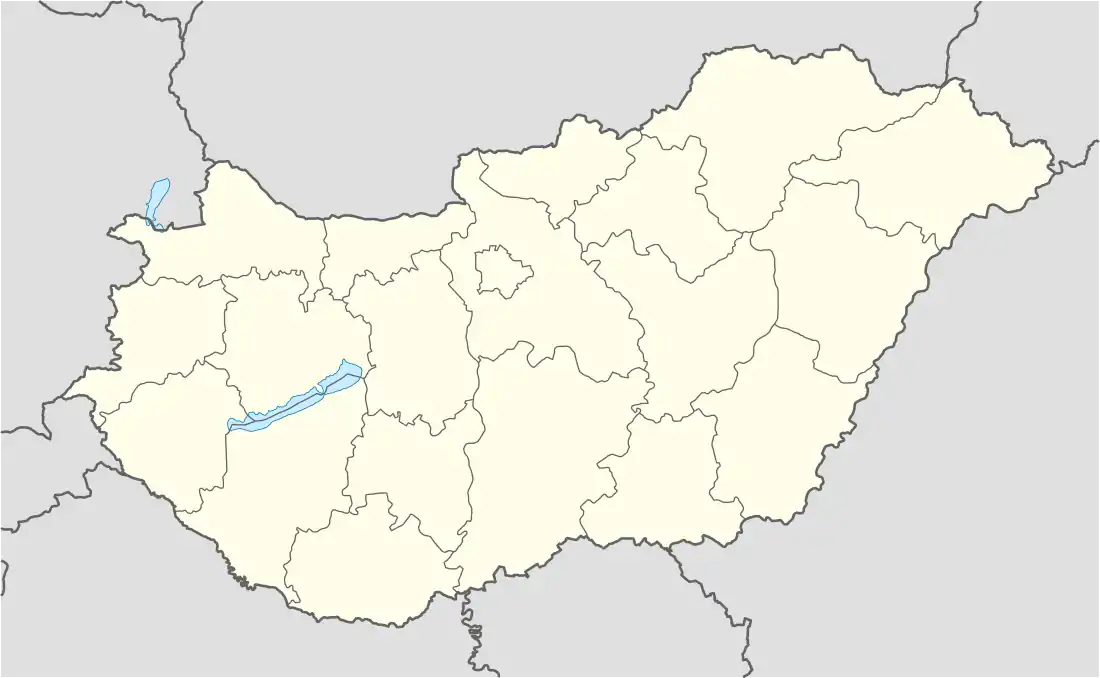Throughout its history, the European country of Hungary, changed the location of its capital city several times.
Middle Ages
- Esztergom, from 1000 to 1256[1][2] (it was also one of the centers of the Principality of Hungary, probably from the reigns of Grand Prince Taksony or Géza)
- Székesfehérvár, it often changed the capital title with Esztergom (one of the centers of the Principality of Hungary until Stephen's crowning. Royal seats, crowning, burials, and Hungarian Diets took place from 1000 to 1543)
- Buda, from 1256[3] to 1315,[4] from 1408 to 1485 and from 1490 to 1536 (1541)[Note 1]
- Temesvár (present-day Timișoara), 1315–1323[4]
- Visegrád, from 1323 to 1408[4]
- Bécs (Vienna), from 1485[5] to 1490, when Matthias Corvinus occupied Lower Austria and put his seat to Bécs (Vienna)
Modern era
- Pressburg/Pozsony (present-day Bratislava) from 1536[6] to 1783 (during Ottoman occupation)
- Lippa (present-day Lipova), from 1541 to 1542, capital of the Eastern Hungarian Kingdom for a short time[7][8]
- Gyulafehérvár (present-day Alba Iulia), from 1542 to 1570, royal residence and the capital of the Eastern Hungarian Kingdom (it was also the centre of the latter Principality of Transylvania)
- Buda, from 1783 to 1873[9]
- Debrecen, in 1849 and in 1944[10] (during the Hungarian Revolution of 1848 and at the end of World War II)
- Budapest (including Buda), 1873[11]–present
Capitals of Pannonia province
Note that the Roman provinces on the territory of today's Hungary, notably Pannonia, had other capitals. Capitals of Roman (Lower) Pannonia, located in the territory of present-day Hungary, were: Aquincum (today Óbuda), Savaria (today Szombathely) and Sopianae (today Pécs).
Notes
- ↑ Pressburg became the capital of Habsburg Hungary (Royal Hungary) in 1536, however the Queen, the infant counter-king John II and George Martinuzzi secured Buda until the Ottoman annexation (1541)
References
- ↑ Hungary in the Middle Ages
- ↑ History of Esztergom
- ↑ Gábor Alföldy, Centuries of the Royal Castle in Buda, History Museum, 2000, p. 4, ISBN 9789637096990
- 1 2 3 Kristó Gyula - Barta János - Gergely Jenő: Magyarország története előidőktől 2000-ig (History of Hungary from the prehistory to 2000), Pannonica Kiadó, Budapest, 2002, ISBN 963-9252-56-5, p. 687, pp. 120-121 ("1315-ben Károly a királyi székhelyet a kevésbé biztonságos Budáról a nehezen megközelíthető Temesvárra helyezte át.."/"In 1315 Charles Robert moved the royal seat from the less safety Buda to the outway Temesvár (Timișoara).", "Károly Róbert a királyi székhelyet 1323 tavaszán Temesvárról Visegrádra helyezte át."/"Charles Robert moved the royal seat from Temesvár (Timișoara) to Visegrád in the spring of 1323")
- ↑ "Amikor Ausztria behódolt a magyaroknak". mult-kor.hu. Retrieved 2013-08-16.
- ↑ Pozsony, the coronation town
- ↑ István Keul, Early Modern Religious Communities in East-Central Europe: Ethnic Diversity, Denominational Plurality, and Corporative Politics in the Principality of Transylvania (1526-1691), BRILL, 2009, p. 61
- ↑ István Homolya, Valentine Bakfark: lutenist from Transylvania, Corvina, 1984, p. 19
- ↑ Elek Fényes: Magyarország geográfiai szótára ("Geographical dictionary of Hungary"), Pest, 1851, B/Buda
- ↑ History of Debrecen
- ↑ "Budapestinfo". Archived from the original on 2007-10-20. Retrieved 2008-04-24.
This article is issued from Wikipedia. The text is licensed under Creative Commons - Attribution - Sharealike. Additional terms may apply for the media files.

